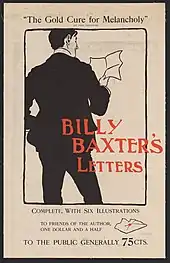Billy Kountz
William J. Kountz Jr. (October 1, 1867 – August 18, 1899) was an American businessman and an early football player and manager for the Allegheny Athletic Association. He gained brief fame as a humorist with his "Billy Baxter" letters.
William J. Kountz Jr. | |
|---|---|
 | |
| Born | October 1, 1867 |
| Died | August 18, 1899 (aged 31) Allegheny, Pennsylvania |
| Resting place | Allegheny Cemetery |
| Education | Chester Military Academy |
| Occupations |
|
| Notable work | Billy Baxter's Letters |
Early life
Kountz was born in Allegheny, Pennsylvania and graduated from its public and high schools. His father was "Commodore" William J. Kountz, a businessman and steamboat line owner. Kountz Jr. attended the Chester Military Academy (now Widener University) for two years before joining the Nicola lumber firm as a traveling salesman. He later established a brickworks with his brother George at Harmarville, Pennsylvania.[1]
Football career
Kountz played guard for the Allegheny Athletic Association from 1891 to 1894. The Pittsburg Press described him as "as big as the side of a house and as strong as a horse and as good natured as the average."[2]
In addition to playing guard, Kountz served as Allegheny's manager in 1892, the season in which the team fielded the first recorded professional football player, William "Pudge" Heffelfinger. Kountz took over the manager's job from O. D. Thompson, who resigned after the 1891 season. After Allegheny's 6–6 tie against their rival the Pittsburgh Athletic Club in October 1892, Kountz told the Pittsburgh media that Allegheny would not be using any "ringers" for a November rematch. However, on the day of the rematch between the two clubs, Heffelfinger, Sport Donnelly, and William C. Malley of the Chicago Athletic Association Football team appeared in the Allegheny line-up. Kountz's status as team leader at that time is questionable: When a threat of a walk-out by the Pittsburgh A.C. threatened the game, Thompson, not Kountz, represented Allegheny during the negotiations. It was also Thompson who signed the team's ledger showing payment to Heffelfinger.[3]
Kountz was again elected Allegheny's manager in 1894.[4] That season, Allegheny and Pittsburgh played a three game series to determine the western Pennsylvania championship team. The second game of the series was scheduled for November 6. Prior to the game, an unnamed Pittsburgh player offered the team's signals to Kountz for $20. Allegheny reported the incident to Pittsburgh and the player was dealt with properly. While both teams had hired ringers, this offense was considered blatant cheating and unacceptable. The Allegheny team went on to win the series and the championship.[5]
"Billy Baxter" letters

Late in his short life, Kountz marketed a bottled tonic called Red Raven Splits.[6] To promote the product, he wrote and distributed a series of humorous short story pamphlets that included Red Raven advertisements.[7] The stories, each in the form of a letter written by "Billy Baxter" in a slangy style to his friend "Jim",[7] were immediately and widely popular; Rollin Lynde Hartt wrote 20 years later that "no other humorist ever jumped into national fame so abruptly."[8]
Kountz's time as a writer was cut short when he died of peritonitis and appendicitis at age 31. He was interred in Pittsburgh's Allegheny Cemetery.[1] A posthumous compilation of his writings was published as a book titled Billy Baxter's Letters.
References
- "W. J. Kountz, Jr., Dead". The Pittsburg Press. August 19, 1899. p. 6 – via Newspapers.com.
- "Among the Amateurs". The Pittsburg Press. October 16, 1892. p. 6.
- PFRA Research. "Five Hundred Reasons: Football's First Pro: 1892" (PDF). Professional Football Researchers Association. Archived (PDF) from the original on 2010-09-29. Retrieved 2020-10-29.
- "Amateur Sports". The Pittsburg Press. August 29, 1894. p. 6 – via Newspapers.com.
- PFRA Research. "The A's Have It: The 3A's Triumph: 1894" (PDF). Professional Football Researchers Association. Retrieved 2020-10-29.
- Swetnam, George (March 13, 1960). "Billy Baxter's Biography". The Pittsburgh Press Sunday ROTO. p. 5 – via Google News Archive.
- Ade, George (August 28, 1899). "'Billy Baxter' is Dead". The Evening Standard. Leavenworth, Kansas. p. 2 – via Newspapers.com.
- Hartt, Rollin Lynde (October 5, 1919). "Billy Baxter's Morning After". The Boston Sunday Globe. p. 40 – via Newspapers.com.
Additional sources
- Peterson, Robert W. (1997). Pigskin: The Early Years of Pro Football. Oxford University Press. ISBN 0-19-511913-4.
- Riffenburgh, Beau & Bob Carroll (1989). "The Birth of Pro Football" (PDF). Coffin Corner. Professional Football Researchers Association. 11 (Annual): 1–30. Archived from the original (PDF) on 2010-11-27.